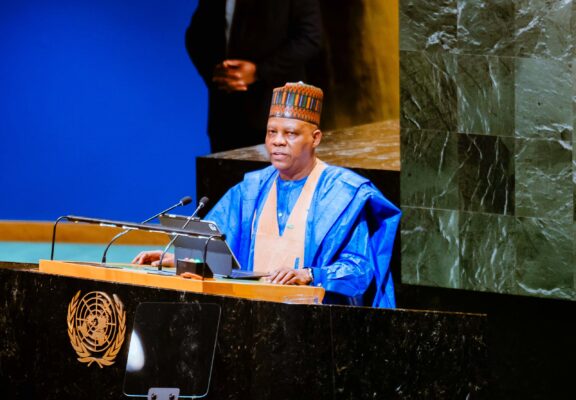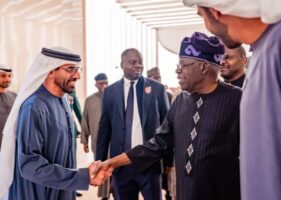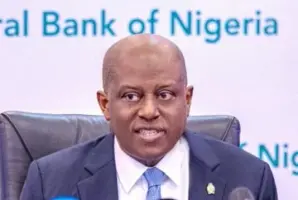At the 80th United Nations General Assembly, Nigeria’s Vice President Kashim Shettima took the global stage with a speech that was as forceful as it was symbolic.
His remarks, centered on the ongoing Gaza conflict, marked a clear departure from the developmentalist and technocratic tones of Nigeria’s past UNGA interventions. This year, Nigeria leaned heavily on moral authority, framing itself as a conscience-driven voice of the Global South.
A Voice for the Oppressed
Shettima’s speech strongly condemned the human toll of the Gaza war. He touched on civilians killed, children displaced, homes reduced to rubble. He did not mince words in labeling the violence as a humanitarian catastrophe and a violation of international law. By grounding Nigeria’s position in the UN Charter and human rights principles, the Vice President signaled that Abuja’s stance was not merely political expediency but anchored on universal values.
This rhetorical choice matters. For decades, Nigeria has positioned itself as Africa’s giant primarily through peacekeeping, regional mediation, and calls for debt relief or climate justice. At UNGA 80, however, it projected itself as a moral arbiter in a deeply divisive conflict, a role usually reserved for the Arab League or a handful of activist states.
From Development Diplomacy to Moral Diplomacy
In past assemblies, former President Muhammadu Buhari emphasized debt restructuring, terrorism, and development financing. President Bola Tinubu at UNGA 78 focused on economic reforms, Africa’s place in global institutions, and calls for a fairer world order. Shettima’s intervention at UNGA 80 pivoted sharply to humanitarian justice.
This pivot suggests Nigeria is testing a new diplomatic posture: from development diplomacy to moral diplomacy. The calculus is simple. In a world riven by conflict, inequality, and geopolitical rivalry, there is space for states that speak with moral clarity. Nigeria, with its size, history of peacekeeping, and global diaspora, has the standing to fill that role. But only if it can follow words with action.
The Risks of Rhetorical Leadership
Yet, there are risks. A hard line against Israel may expose Nigeria to diplomatic friction with Western allies, particularly the United States. The accusation of selective outrage may also arise: why condemn Gaza so forcefully when Nigeria still grapples with insurgency, kidnappings, and internal displacement? Without demonstrable domestic progress, moral leadership abroad can ring hollow.
Moreover, UN speeches often inspire but rarely change realities unless backed by sustained diplomacy. Nigeria will need to decide whether to invest political capital in UN resolutions, humanitarian aid, and coalition-building around the Palestinian cause. If not, it risks being seen as a state that only makes lofty pronouncements.
Pertinence of a broader positioning
Despite these risks, Shettima’s speech reflects an important assertion of Nigeria’s foreign policy identity. It says to the world: Nigeria will not remain silent in the face of injustice, even in conflicts beyond Africa. It also signals to Nigerians at home and in the diaspora that their government intends to reclaim a bolder voice in multilateral forums.
For Africa, this matters even more. The continent often laments marginalization in global decision-making. By speaking firmly on Gaza, Nigeria reminds the world that Africa’s moral and political voice cannot be ignored on matters of war and peace.
In the final analysis, Nigeria’s intervention at UNGA 80 was not without controversy, but it was timely and significant. In elevating humanitarian justice as a diplomatic priority, Vice President Shettima charted a course that could redefine Nigeria’s global standing.
The challenge now is to move from rhetoric to results. The Vice President and his boss must now anchor moral clarity with policy coherence, both abroad and at home. If Nigeria can bridge that gap, UNGA 80 may be remembered as the moment the country reclaimed not just its size, but its moral weight, on the world stage.
About the Author
The author, Collins Nweke is an International Trade Consultant & Economic Diplomacy researcher. He was a former Green Councillor at Ostend City Council, Belgium, where he served three consecutive terms until December 2024. He is a Fellow of both the Chartered Institute of Public Management of Nigeria and the Institute of Management Consultants. He is also a Distinguished Fellow of the International Association of Research Scholars and Administrators, serving on its Governing Council. A columnist for The Brussels Times, Proshare, and Global Affairs Analyst with a host of media houses, Collins writes from Brussels, Belgium. X: @collinsnweke E: admin@collinsnweke.eu W: www.collinsnweke.eu





